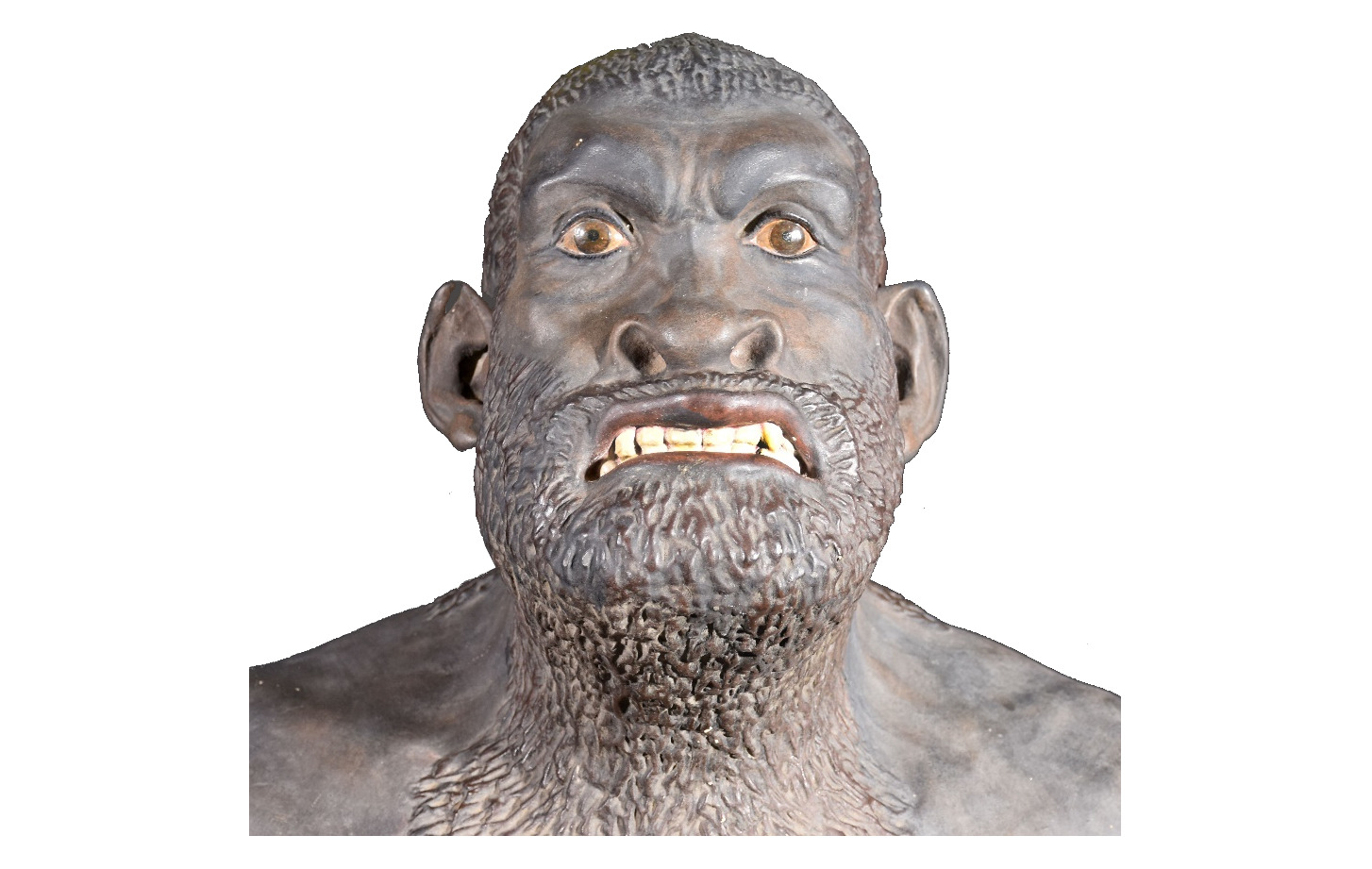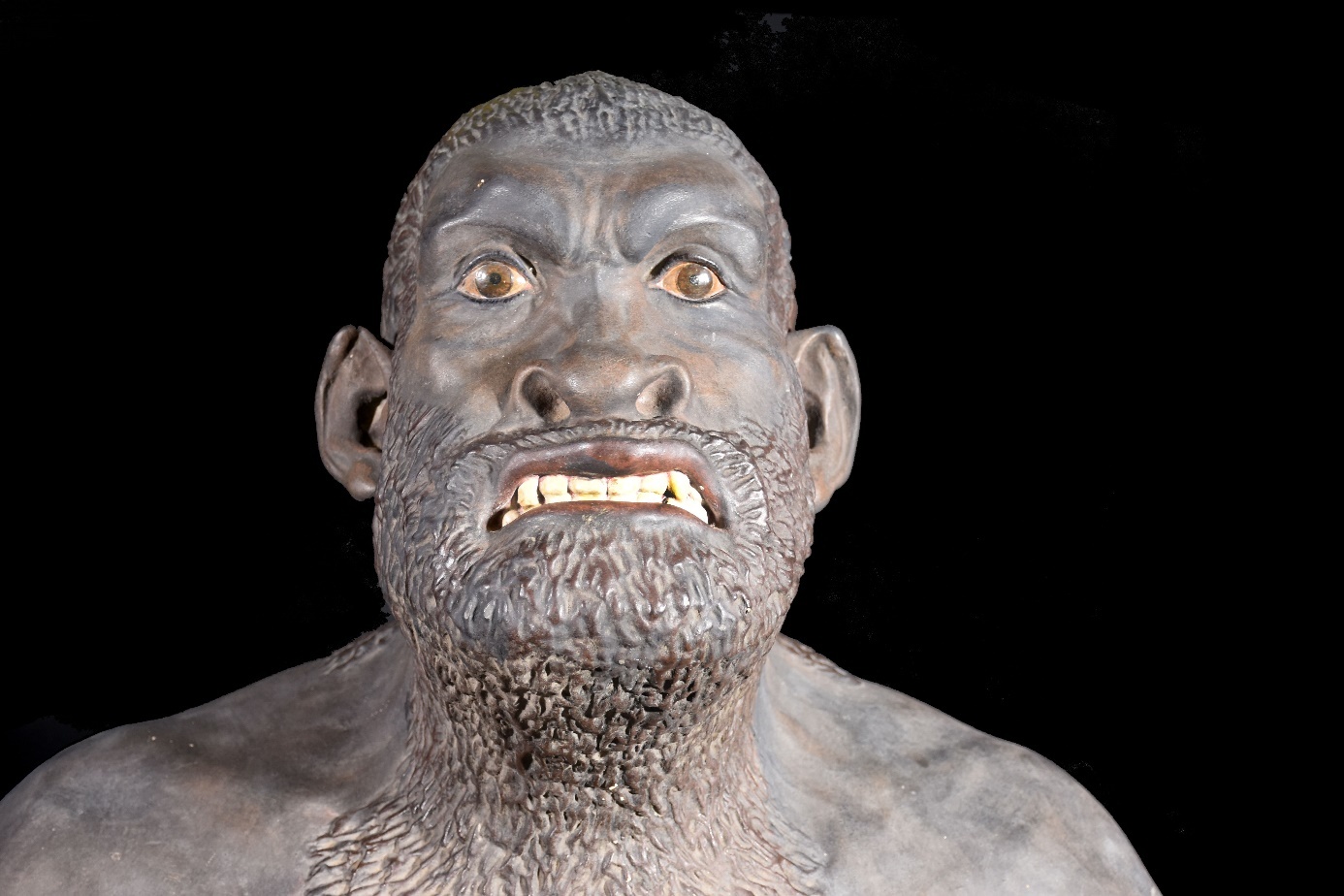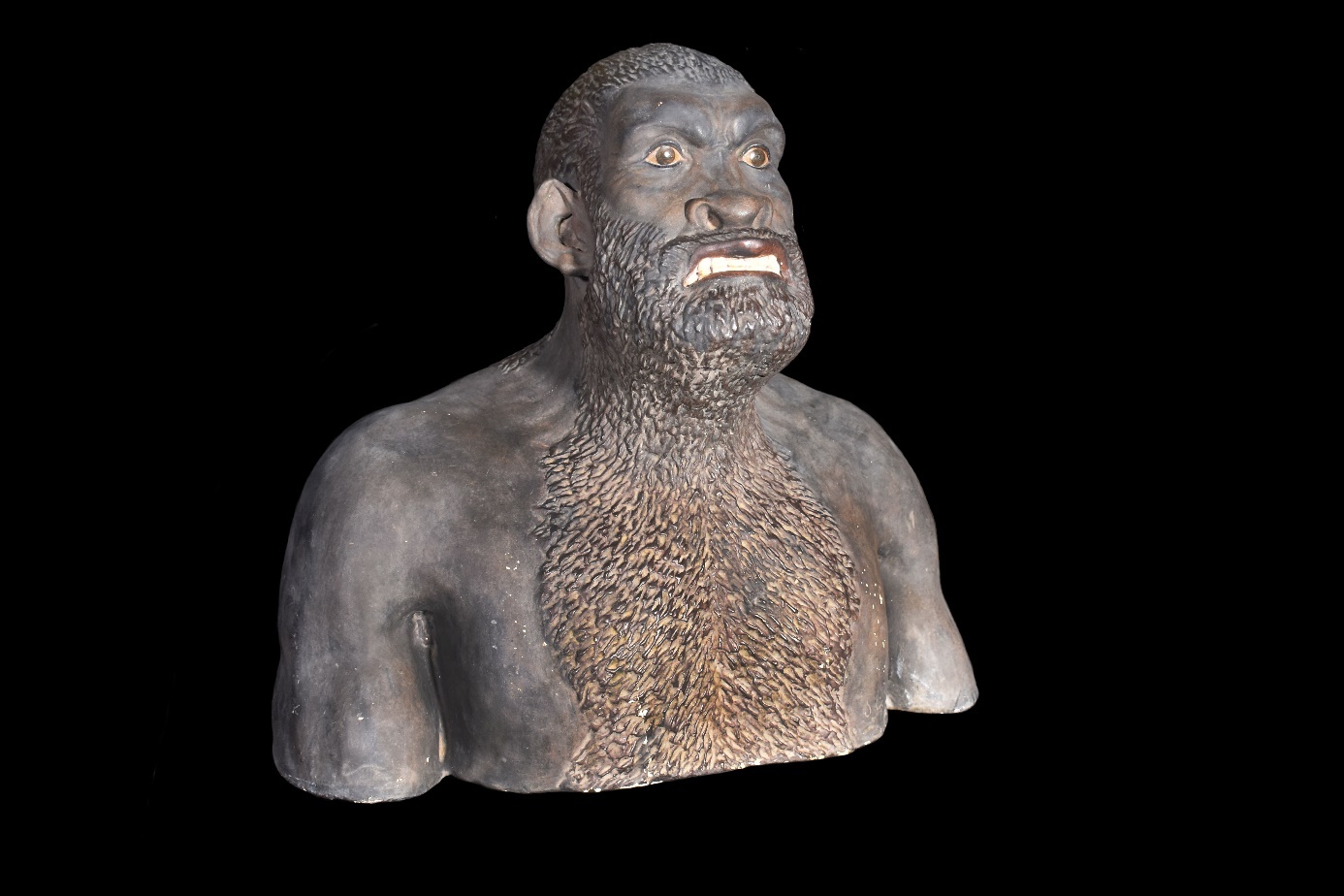A Bust of the Neanderthal Man
Beschreibung
This plaster sculpture (height of 54.6 cm) is part of the anthropology collection of the La Plata Museum (Argentina). It was inspired by the fossil skull fragment discovered in 1856 in the Neander Valley (Germany). This bust is the first known 3 D reconstruction of the Neanderthal man. It was created in the 1880s by sculptor Guernsey Mitchel, following the instructions of the US natural science dealer Henry Ward.
Some of its specific features, such as the hirsute body, frown, red eyes, and teeth reflect what scientists from that period believed the primitive man looked like. Reconstructions of the physical appearance of human ancestors had been common since the 19th century. Frequently created by artists with the assistance of scientists, they exemplify the preconceptions concerning the greater or lesser differences between modern beings and their ancestors. These reconstructions enabled the wider public to imagine what life was like in the prehistoric times.
This bust was sold at the end of the 19th century by the Ward’s Natural Science Establishment, in Rochester (United States), to the La Plata Museum. In the 19th century, natural science, anthropology and archaeology specimens circulated as casts or models. Major natural history museums set up their own casting workshops for trading and exchanging with other institutions. Specialized dealers also created and commercialized models and casts to universities, schools and museums to reach a larger audience.
Further Reading:
- Marina Laura Sardi: (August 30, 2021). Bust of the Neanderthal Man. SciCoMove — Scientific Collections on the Move. Retrieved February 19, 2025 from <https://doi.org/10.58079/twrk>.
References:
- Paul H. Lambers, Margit Berner & Katrin Kremmler (2022): “From anatomy to palaeo-raciology: Two Neanderthal reconstructions at the NHMW 1924/25”, Annalen des Naturhistorischen Museums in Wien, Serie A, volume 123, pp. 33 - 64, <http://verlag.nhm-wien.ac.at/pdfs/123A_033064_Lambers.pdf>
- Stephanie Moser (1992): “The Visual Language of Archaeology: A Case Study of the Neanderthals”, Antiquity, 66: 831–844.
- Stefan Schlager & Ursula Wittwer-Backofen (2013): Images in Paleoanthropology: Facing Our Ancestors. In: Henke, W., Tattersall, I. (eds) Handbook of Paleoanthropology. Springer: Berlin, Heidelberg, <https://doi.org/10.1007/978-3-642-27800-6_70-1>.
- Ward’s Natural Science Establishment, inc. (1893): Catalogue of Human Skeletons, Anatomical Models, Busts and Masks. 6th ed. Rochester, N.Y.: Ward’s Natural Science Establishment, <https://wardproject.org/items/show/912>.
Some of its specific features, such as the hirsute body, frown, red eyes, and teeth reflect what scientists from that period believed the primitive man looked like. Reconstructions of the physical appearance of human ancestors had been common since the 19th century. Frequently created by artists with the assistance of scientists, they exemplify the preconceptions concerning the greater or lesser differences between modern beings and their ancestors. These reconstructions enabled the wider public to imagine what life was like in the prehistoric times.
This bust was sold at the end of the 19th century by the Ward’s Natural Science Establishment, in Rochester (United States), to the La Plata Museum. In the 19th century, natural science, anthropology and archaeology specimens circulated as casts or models. Major natural history museums set up their own casting workshops for trading and exchanging with other institutions. Specialized dealers also created and commercialized models and casts to universities, schools and museums to reach a larger audience.
Further Reading:
- Marina Laura Sardi: (August 30, 2021). Bust of the Neanderthal Man. SciCoMove — Scientific Collections on the Move. Retrieved February 19, 2025 from <https://doi.org/10.58079/twrk>.
References:
- Paul H. Lambers, Margit Berner & Katrin Kremmler (2022): “From anatomy to palaeo-raciology: Two Neanderthal reconstructions at the NHMW 1924/25”, Annalen des Naturhistorischen Museums in Wien, Serie A, volume 123, pp. 33 - 64, <http://verlag.nhm-wien.ac.at/pdfs/123A_033064_Lambers.pdf>
- Stephanie Moser (1992): “The Visual Language of Archaeology: A Case Study of the Neanderthals”, Antiquity, 66: 831–844.
- Stefan Schlager & Ursula Wittwer-Backofen (2013): Images in Paleoanthropology: Facing Our Ancestors. In: Henke, W., Tattersall, I. (eds) Handbook of Paleoanthropology. Springer: Berlin, Heidelberg, <https://doi.org/10.1007/978-3-642-27800-6_70-1>.
- Ward’s Natural Science Establishment, inc. (1893): Catalogue of Human Skeletons, Anatomical Models, Busts and Masks. 6th ed. Rochester, N.Y.: Ward’s Natural Science Establishment, <https://wardproject.org/items/show/912>.
Kurzbeschreibung
This plaster sculpture (height of 54.6 cm) is part of the anthropology collection of the La Plata Museum (Argentina). It was inspired by the fossil skull fragment discovered in 1856 in the Neander Valley (Germany). This bust is the first known 3 D reconstruction of the Neanderthal man. It was created in the 1880s by sculptor Guernsey Mitchel, following the instructions of the US natural science dealer Henry Ward.
Institution
Typ
Bust of Neanderthal Man (HOMO NEANDERTHALENSIS)
Thema
paleo-anthropology, facial reconstruction in paleo-anthropology, casts in paleo-anthropology, natural history dealers, history of archaeology
Beteiligte Personen und Organisationen
The sculpture was created by Guernsey Mitchel, following the instruction of Henry Ward. At the end of the 19th century the Museum of La Plata purchased the sculpture to the Ward’s Natural Science Establishment (USA).
Zeit
1880s
Ort
Rochester, NY, USA
Maße/Umfang
Height: 564 mm
Material/Technik
Plaster sculpture
Identifikator
Inventory number: 5581
Förderung
Project: SciCoMove - Scientific Collections on the Move: Provincial Museums, Archives and Collecting Practices (1800-1950).
Funding: This project has received funding from the European Union’s Horizon 2020 research and innovation programme under the Marie Skłodowska-Curie grant agreement No 101007579.
The contents of this publication are the sole responsibility of the SciCoMove consortium and do not necessarily reflect the opinion of the European Union.
Funding: This project has received funding from the European Union’s Horizon 2020 research and innovation programme under the Marie Skłodowska-Curie grant agreement No 101007579.
The contents of this publication are the sole responsibility of the SciCoMove consortium and do not necessarily reflect the opinion of the European Union.
Dateien



Quellenangabe
„A Bust of the Neanderthal Man,” SciCoMove, zuletzt aufgerufen am 1. Juli 2025, https://ausstellungen.deutsche-digitale-bibliothek.de/scicomove/items/show/1.
